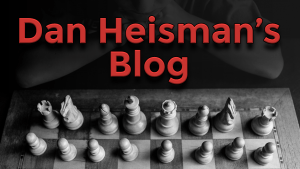Q&A with Coach Heisman Dec 27, 2013
"I read chess books and I understand them but when I get the same situations in a game I don't do the right things."
This is a common complaint, but it is so generic that, unless I knew exactly what the viewer read and his chess situation, it is impossible to pinpoint the solution. For example, the viewer might be referring to missing tactics or not remembering openings, quite different issues. Here are some of the most common reasons a player can't apply what he read in a book (with links for further reading):
- The book is about tactics but in a game no one is holding up a sign saying "White to play and win" like in the book so the tactic is missed (Seeds of Tactical Destruction and A Different Approach to Studying Tactics)
- The book is about advanced positional play but the player doesn't even know how to keep his pieces safe (Chess Books and Prerequisites)
- The book is about safety but the player is only using tactics for offense and doesn't know how (or doesn't take the time) to check to see if his own candidate moves are safe (The Most Common and Important Use of Tactics)
- The book is about specific opening lines but the player does not know how to get out all his pieces safely when he gets out of his book (Opening Principles)
- The book is about careful planning and tactics but the player thinks a 15-minute game is a long game and thus only has an average of (~900/~40) = 22.5 seconds per move, hardly long enough to apply the same type of thinking that grandmasters do when their game is 40 moves in 2 hours (The Road to Carnegie Hall and The Fun of Pros and Cons)
This brings up another key point. Many of the viewers' questions were under the implication that learning how to play chess better was a matter of acquiring more "chess knowledge" such as opening lines, endgame positions, tactical patterns, and principles. While it is undoubtedly true that this knowledge is very important and even vital to becoming a good player, it is not the most important issue. The most important is to develop your skills as an analyst and as an evaluator.
Go to any big tournament and you will see examples showing that this is true: there will be many 10 and 11-year-old players rated 1800, 1900, or higher (the average adult rating is much lower than that). And there will be many adult players rated 1500 or 1600 or 1700 who have read ten times as much about chess - and know a lot more - than these higher rated youngsters. Yet when the youngsters play these adults, they show why they are better players even with much less knowledge - it is because the youngsters are better analyzers than the lower rated adults.
I noticed this myself when I started to play seriously as a teenager. Once I realized what it took to analyze well, I often beat higher rated adults who knew a lot more about chess than I did just by hanging around and taking time to carefully out-calculate them when the position got critical. It became apparent to me that I would soon be higher rated than they, not because my knowledge would outstrip theirs, but because as I picked up some knowledge it would augment my already superior analytical ability. So two years after I started tournament play, I became a 1900 player even though my knowledge, while vastly improved, was still trailing most adults.
The most highly correlated skill with your chess rating is your analytical ability. Approaching chess knowledge as though it is fundamentally linked to improvement can be a big mistake, even though knowledge is clearly positively correlated to chess ability as well. I have written many, many articles - and books - on improving your thinking process and analytical capability. Further, many chess.com resources (videos, automated tools) are also helpful in improving your analytical skills.
Further, don't forget that ability is also closely related to your time management skills, an issue that most improving players overlook completely. In fact, some almost view the clock as an "outside" agent rather than an integral part of the game, to their detriment.
This leads to another viewer question: "What was the most 'aha!' moment you had when learning to play chess?" Great question: it's when I realized that there are some threats that are impossible to meet, so waiting unti the opponent moves and then trying to find them is a potentially hopeless task. You have to make sure, before you move, that your opponent does not have a forcing move (check, capture, or threat) that you can't meet next move. To consistently do this I call Real Chess, and instead to just wait til the opponent moves and hope you can meet his threats I call Hope Chess. This was the subject of my first ever published web article, The Secrets to Real Chess - almost 15 years ago!
One viewer complained that he played 1...e5 to 1.e4 and also played the King's Indian Defense, but he never got exciting games. Of course, these two openings often do lead to exciting games - that's why Fischer, Kasparov, Korchnoi, and Nakamura were/are King's Indian devotees, but that's the point: it's not just the opening you choose that makes a game exciting; it's how you play it. For example, the willingness to accept imbalances creates exciting positions: you give up something to get something else, such as giving up some of the integrity of your pawn structure to win the bishop pair.
That's not the only thing that can make a game exciting; for example, the willingness to castle opposite sides with queens on the board will lead to more exciting games, on the average, than same-side castling. During the show, I demonstrated that the Open Sicilian (e.g. 1.e4 c5 2.Nf3 d6 3.d4 cxd4 4.Nxd4) creates imbalances in that each side has a semi-open file and White's lead in development is offset by Black having two central pawns to White's one. So grandmasters often prefer the Sicilian when they are trying to win because it can lead to imbalanced play and chances for both sides. On the other hand, the Exchange French with 1.e4 e6 2.d4 d5 3.exd5 exd5 leads to symmetric pawn play with a single open file where all rooks can be exchanged, and more boring play. Yet a player who is willing to play dynamically would likely make the Exchange French into a more exciting game than a more amateurish player who plays the Open Sicilian passively.
Early in the broadcast, it was brought to my attention that a glich in the broadcasting software was preventing my audience from growing past about 50 viewers. Of course, I am just the provider of content for my show and don't have any direct control over technical problems like these. If it turned out and was brought to my attention that, say, restarting the telecast software would have solved the problem (it wasn't - I'm just making this up as an example hypothesis), of course I would have done so ASAP. As it was, the mods were working behind the scenes to fix the problem, so I am greatful to them for this help. Hopefully the entire problem would located and fixed before the next broadcast; Chess.com was showing the Pan-Am Intercollegiate Championships later in the day.
BTW, during the show I mentioned that voting for the Chess Cafe "Book of the Year" will be between Jan 8 and Jan 20 at http://www.chesscafe.com/Reviews/botyr1.htm. My book "The World's Most Instructive Amateur Game Book" will be a contender so if you read that book and think it should win, please stop by and vote for it during the voting period. Of course, if you think another book is better, vote for that one instead  .
.
The next show on Jan 10 will be open to all. Happy holidays and a happy near year to those "all" 






